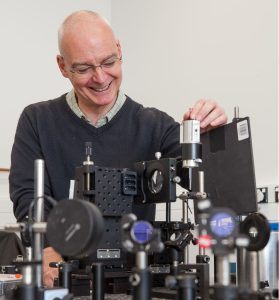
- This event has passed.
Spectroscopy in 21st century New Zealand: from solar cells to fish waste
July 29, 2022 @ 6:00 pm - 7:00 pm
$5Professor Keith Gordon, Department of Chemistry, University of Otago.
Vibrational spectroscopy is a potent method of analysing molecular structure within small volumes and at fast timescales. In this presentation I will try to cover off three related but distinct areas of interest.
Firstly, I will discuss how using a suite of spectroscopic methods, and by studying a series of complexes (metal-based donor-acceptor systems) in which parameters are carefully controlled,1 it is possible to develop design principles for excited state properties such that one can enhance electronic absorption and increase excited state lifetimes.2 Useful properties in both solar cells3 and photocatalysis. The understanding of how these properties, both ground and excited state, are modulated by driving force and effective conjugation is not straightforward.
Secondly, the use of computational chemistry in modelling properties of compounds has become ubiquitous in modern chemistry. However these do not always predict molecular behaviour effectively and unpicking the extent of deviation between theory and experiment reveals some interesting problems in our reliance on computational methods.4 Our studies on the spectroscopy of donor-acceptor and π, π* systems highlight these issues.5
Finally, our experimental development, originally aimed at understanding ground and excited state properties of metal complexes and other donor-acceptor systems, has provided us with tools that are amenable to analytical spectroscopy. These are critical techniques that can add value to products in New Zealand. I will outline some of these in the study of primary produce and pharmaceuticals. More recently we have used low-frequency Raman spectroscopy6 to evaluate crystallinity (and order in general) in structures as varied as solar cell polymers7 to active pharmaceutical ingredients.8 Our studies in these areas will also be described.
- Larsen, C. B.; van der Salin, H.; Shillito, G. E.; Lucas, N. T.; Gordon, K. C., Tuning the Rainbow: Systematic Modulation of Donor-Acceptor Systems through Donor Substituents and Solvent. Inorg. Chem. 2016, 55, 8446-8458.
- Shillito, G. E., et al., Dramatic Alteration of 3(ILCT) Lifetimes Using Ancillary Ligands in Re(L)(CO)3(phen-TPA)(N+) Complexes: An Integrated Spectroscopic and Theoretical Study. J. Am. Chem. Soc. 2018, 140, 4534-4542.
- Chandrabose, S., et al., High Exciton Diffusion Coefficients in Fused Ring Electron Acceptor Films. J. Am. Chem. Soc. 2019, 141, 6922-6929.
- Barnsley, J. E.; Shillito, G. E.; Mapley, J. I.; Larsen, C. B.; Lucas, N. T.; Gordon, K. C., Walking the Emission Tightrope: Spectral and Computational Analysis of Some Dual-Emitting Benzothiadiazole Donor-Acceptor Dyes. J. Phys. Chem. A 2018, 122, 7991-8006.
- Huff, G. S.; Gallaher, J. K.; Hodgkiss, J. M.; Gordon, K. C., No Single Dft Method Can Predict Raman Cross-Sections, Frequencies and Electronic Absorption Maxima of Oligothiophenes. Synth. Met. 2017, 231, 1-6.
- Bērziņš, K.; Fraser-Miller, S. J.; Rades, T.; Gordon, K. C., Low Frequency Raman Spectroscopic Study on Compression-Induced Destabilization in Melt-Quenched Amorphous Celecoxib. Mol. Pharm. 2019.
- Sutton, J. J.; Nguyen, T. L.; Woo, H. Y.; Gordon, K. C., Variable-Temperature Resonance Raman Studies to Probe Interchain Ordering for Semiconducting Conjugated Polymers with Different Chain Curvature. Chem.-Asian J. 2019, 14, 1175-1183.
- Salim, M.; Fraser-Miller, S. J.; Sutton, J. J.; Be̅rziņš, K.; Hawley, A.; Clulow, A. J.; Beilles, S.; Gordon, K. C.; Boyd, B. J., Application of Low-Frequency Raman Scattering Spectroscopy to Probe in Situ Drug Solubilization in Milk During Digestion. J. Phys. Chem. Lett. 2019, 2258-2263.
Prof Keith Gordon is this year’s recipient of the University of Otago Distinguished Research Medal. In a career spanning three decades, Prof Gordon has published more than 350 papers in scientific journals which have accrued more than 11,000 citations.
Keith Gordon received his BSc Hons (I) in 1986 and PhD in 1989 in chemistry from Queens University, Belfast, UK. His PhD research, under the direction of Professor John J McGarvey, focused on laser spectroscopy of solar energy compounds. He was awarded a Director’s Fellowship at Los Alamos National Laboratories, USA, and worked with Professor W H Woodruff from 1989 – 1992 on ultrafast laser spectroscopy of biological systems and solar energy materials. In 1993 Keith took up a lecturing post in the Chemistry Department at the University of Otago, Dunedin, New Zealand, becoming Professor in 2009 in that department; he is currently Head of the Department. Keith was President of the New Zealand Institute of Chemistry in 2006 and is a founding Principal Investigator in the MacDiarmid Institute for Advanced Materials and Nanotechnology and the Dodd-Walls Centre for photonic and quantum technologies. Keith is a Fellow of the Royal Society of New Zealand, the Royal Society of Chemistry and the New Zealand Institute of Chemistry. Keith’s research interests focus on the understanding the properties of conducting polymers, nanostructured electromaterials, such as found in dye-sensitised solar cells, dairy products and pharmaceuticals using spectroscopy and computational chemistry.


